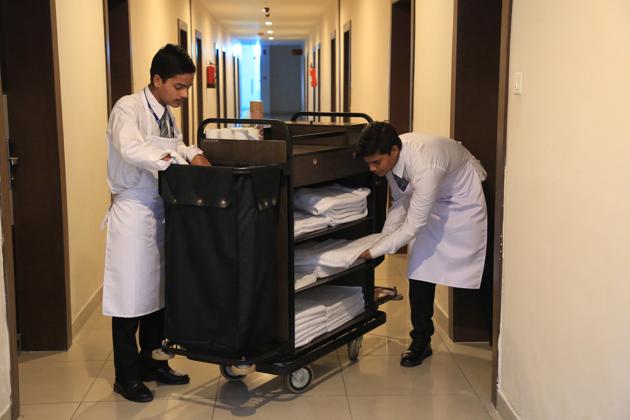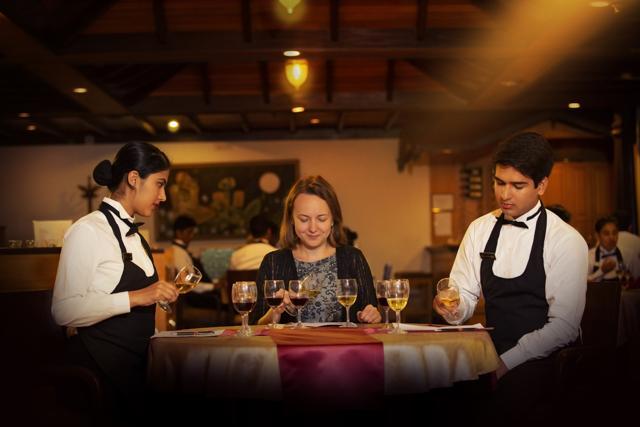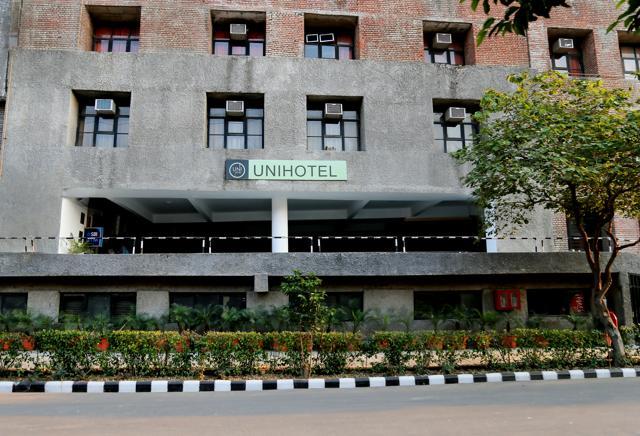Hospitality institutes now have their own restaurants, bakeries, hotels
The idea is to prepare students for life on the job.
They used to learn about wine from textbooks and bake in the college lab. Now, hotel management and hospitality students are running their own hotels on campus, putting together wine lists and crafting menus at their own restaurants.

At Lovely Professional University (LPU), there’s a 35-room Uni Hotel run by hospitality students, where they can practise what they learnt in their classrooms and get some paid, real-world experience. Some students take charge of housekeeping, others handle the front desk and help guests check in; at the restaurant, they experiment with different cuisines.
At Manipal’s Welcomgroup hotel management school, students have courses on wine and wine-and-food pairings conducted by experts from the International Sommelier Guild in the US. At Ashok Institute of Hospitality and Tourism Management, youngsters run a mocktail bar and multi-cuisine restaurant attached to a hotel.
“As more students aim to study abroad, institutes back home are striving to be at par with international hotel management colleges,” says Janhavi Ruparel, institutional consultant at overseas education consultancy The Red Pen. “New facilities like these make interviews and practical tests easier, also for students looking to pursue a career abroad.”

Check-in time
In addition to the 35 rooms, Uni Hotel in Jalandhar has a restaurant, a gym and conference facilities. It is open only to university guests.
“Working at the hotel is optional for LPU students. “Some take it up as a part-time job or internship,” says Pratham Mittal, head of new initiatives at the institute. “There is a limit on how many hours a student may work so that it doesn’t clash with their lectures and recreation time. We also get interns from other institutes. We pay each student between ₹800 to ₹1,200 a day. Actual management of the hotel — in areas such as maintenance, upkeep, inventory, etc — is outsourced by the university.”
Guests include recruiters in, parents visiting for admission queries and even students from other universities visiting for contests, conferences or general enquiries.
Before the hotel was set up, students learned theories in classes and interned during their vacations. “And that was the only time when they practiced their skills,” Mittal says.
Now, the hotel management institute takes up the first three floors of its 10-storey structure, and the rest is the hotel.
“When we go out for summer internships at hotels, we already have experience. In fact, during internships we don’t get to interact with guests. And in the kitchen, they generally get to chop vegetables and that’s it,” says Yamini Chandrasekaran, a final-year hotel management student at LPU. “At Uni Hotel we get to do much more.”
A welcome change
At the Welcomgroup Graduate School of Hotel Administration, part of Manipal Academy of Higher Education, students learn about wine from experts of the US International Sommelier Guild. “Our fundamentals of wine course teaches students to taste and recognise types of wine, incorporate the beverage while cooking meat, and other intricacies,” says K. Thirugnanasambantham, principal of the institute. “Setting it up was not easy. We got a licence from the Karnataka Wine Board, which allows wine tasting for educational purposes. For real experts to conduct such a course, we had to reach out to the US.”
A few sommeliers from the guild fly down to India for 12 weeks a year to teach the course. Students are certified by the guild. “This helps our students in placements,” Thirugnanasambantham says.
It takes us at least four weeks to get familiar with the wines from across the country, says Mohini Mohan, a final-year hotel management student. “While we have a separate module on Indian wine types and craft wines, and the role of breweries, we are also taught about the traditional wines from Italy, Germany, France.”

A mock bar
At the Ashok Institute of Hotel and Tourism Management in Delhi, which is located inside Hotel Samrat and is run by the India Tourism Development Corporation, students experiment with non-alcoholic drinks at a mock bar and craft multi-cuisine menus at a real restaurant.
“Students come up with their own mocktail creations,” says principal Anita Bimal. “Knowledge cannot be restricted to journals. So we encourage students to interact with our guests and really learn their trade. Students are assessed on how they handle complaints, how they handle service at the table, etc.”
Discover the complete story of India's general elections on our exclusive Elections Product! Access all the content absolutely free on the HT App. Download now!
Get latest news on Education, along with Board Exam, Competitive Exam and Exam Result at Hindustan Times. Also get latest Job updates on Employment News









